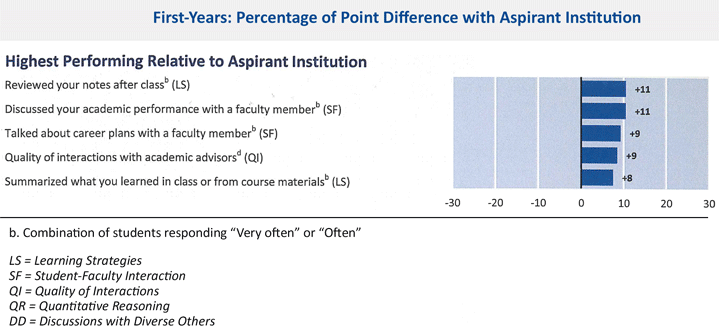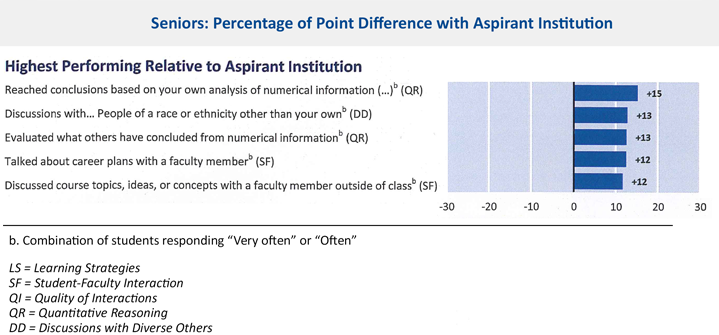Interaction between students and faculty continues to occur at a higher rate at Catawba College than between students and faculty at other Southeast Private "aspirant" institutions.
This interaction attribute was revealed via the responses that first-year and senior Catawba students submitted while participating in the 2014 National Survey of Student Engagement (NSSE). For the past 15 years, NSSE has been offered as an instrument to chart national trends in student learning and engagement and as a tool that individual institutions can use to track progress on initiatives to improve student learning.
The 2014 NSSE collected information from more than 355,000 first-year and senior students attending 622 U.S. colleges and universities that opted to participate in the survey. These students self-reported on their participation in activities and programs that promote their learning and personal development. The results provide an estimate of how undergraduates spend their time and what they gain from attending their college or university.
Forty-one percent of the seniors (90 students) at Catawba took part in the survey, while 33 percent of Catawba's first-year students (141 students) participated.
Catawba First-Years
Catawba first-year students tracked with their peers at aspirant institutions in reporting that they engaged in high-impact practices such as participating in a learning community, service learning or participating in research with a faculty members. These first-years reported that they engaged in learning strategies at higher percentages than their peers. These learning strategies included reviewing notes after class and summarizing what they learned in class or from course materials. Catawba first-years also said their courses challenged them to do their best work.

"Catawba's first-year students benefit from the engagement and dedication of their first-year seminar courses and the faculty who lead those classes," said Dr. Michael Bitzer, Catawba's provost and professor of politics and history at Catawba. "One of the critical parts of these interdisciplinary and unique seminar courses is that students learn various methods of study strategies, and these results reflect helping our students transition into their collegiate studies."
Even as a first year student at Catawba, those who participated in NSSE said they talked about career plans with faculty and obtained feedback on their academic performance from faculty members. Catawba first-years rated the quality of interactions with their academic advisors nine percentage points higher than did their peers at other Southeast Private "aspirant" institutions.
Emphasis on Academic Work
Catawba Seniors
Catawba seniors reported that their college emphasized spending significant time studying and on academic work at a rate higher than that of their peers at aspirant institutions. They also responded that their academic courses challenged them to do their best work at a higher rate than their peers reported.
At a rate 15 percent higher than that of their peers, Catawba seniors noted they reached conclusions based on their own analysis of numerical information, and evaluated what others had concluded from numerical information at a rate 13 percent higher.
These seniors responded that they had talked about career plans with a faculty member and discussed course topics, ideas or concepts with a faculty member outside of class at a rate 12 percent higher than their peers.
Catawba seniors also reported on how much their Catawba experience contributed to their perceived gains in knowledge, skills, and personal development. Eighty-nine percent reported that they gained critical and analytical thinking skills. Eighty-three percent said they could write and speak more clearly and effectively, while 81 percent reported they had improved in their ability to work effectively with others.
Ninety-five percent of Catawba seniors rated their overall experience at Catawba as "excellent" or "good" and eighty-seven percent said they would "definitely" or "probably" attend this institution again. Their positive and affirmative responses about their college experience and their college were several percentage points higher than those reported by their peers at aspirant institutions.

Bitzer said the 2014 NSSE results confirm that Catawba continues to capitalize on her strength "in faculty-student interactions, as well as that our seniors experience growth in the important skills that employers seek in today's college graduates, namely critical and analytical thinking, and both written and verbal communication capabilities."
"Our students' responses affirm that we are true to our institutional mission by providing 'an education rich in personal attention,' and that blends the skills gained in the liberal arts with career preparation" he said. "Being a small regional college allows us to maintain our low student-to-faculty ratio and truly focus on our students as individuals, as well as fulfilling Catawba's mission to our students."
Since 2009, Catawba College and her students have participated in NSSE. For complete details on the 2014 NSSE, visit http://nsse.iub.edu.
